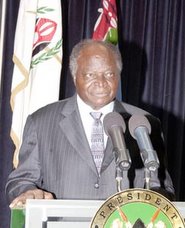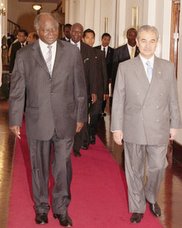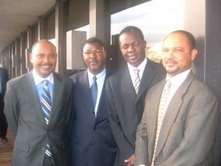
Congratulations are in order to the outgoing Tanzanian Foreign Minister Dr Asha-Rose Migiro for her appointment as the UN Deputy Secretary General, and principal assistant to the UN new Secretary General Ban Ki-moon.
Her appointment is an honour to not only to Tanzanians, but to the African women in general. She is the second woman (first from Africa and the developing world) to rise to such high position in the premier world body. Dr Migiro joins her compatriot Anna Kajumulo Tibaijuka (Executive Director, UN-HABITAT) in working for the United Nations. We join hands with others in wishing Dr Migiro the very best in her newest assignment.
Tanzanians are ecstatic with this elevation particularly considering Asha-Rose increases the number of their compatriots to two who are or will be serving on the world stage. They are ecstatic because Tanzanians would care less what tribe these two women are. As far as they are concerned they are all Tanzanians — end of the story. Tribalism is at the very bare minimum if it exists at all in their country. How we wish Kenyans could be the same.
Tanzanians are ecstatic with this elevation particularly considering Asha-Rose increases the number of their compatriots to two who are or will be serving on the world stage. They are ecstatic because Tanzanians would care less what tribe these two women are. As far as they are concerned they are all Tanzanians — end of the story. Tribalism is at the very bare minimum if it exists at all in their country. How we wish Kenyans could be the same.
Kenyans are jealous of the rise of the Tanzanians in prominent positions in the world body. Yes, we are jealous, whether we like to admit it or not. The fact of the matter is that Kenyans cannot rise to such prominent positions in the world stage simply because of one major problem. Kenyans' number one enemies are Kenyans themselves. In comparison to Tanzanians, Kenya’s tribalism gauge is so high, almost equivalent to the times of apartheid in South Africa, in terms of how we discriminate against each other in favouring our own kind at the slightest chance. Although President Mwai Kibaki is trying to change this culture of tribalism to a bare minimum, and he is doing great to some extent, but the rest of us all have a long way to go.
It is like corruption, although we need to stop it from the top, we must fight it from the bottom up and not top down only. Anglo Leasing or Goldenberg scandals are not corruption; those were acts of broad day-light robberies. Period. Corruption is to bribe the traffic police officer to let you go free after a traffic violation, or bribing a public official to provide you with service that he or she is salaried to provide in the course of their duties.
It is like corruption, although we need to stop it from the top, we must fight it from the bottom up and not top down only. Anglo Leasing or Goldenberg scandals are not corruption; those were acts of broad day-light robberies. Period. Corruption is to bribe the traffic police officer to let you go free after a traffic violation, or bribing a public official to provide you with service that he or she is salaried to provide in the course of their duties.
But tribalism is our killer disease. It is our cancer. In the Government and pubic offices, from permanent secretaries down to the district and divisional heads and in the private sector, from the chief executive officers down to the branch managers always prefer their kind in appointments and promotions even if their (kind) happen to be mediocre employees. Tribalism is Kenya at its best. We can all deny that we are not tribalists the same way White Americans deny not to be racist even if they don’t practice it per se.
This column once challenged the Permanent Secretary for Education Prof Karega Mutahi to make the list public of the beneficiaries of the 1,000 yearly scholarships provided to the Kenya Government by the generous Chinese Government. He didn’t take the challenge because he knows that majority of the beneficiaries of those scholarships (and many other scholarships that Kenyans are not aware of) are from his tribe. The scraps are usually given to the senior officers in the ministry to distribute among their friends, relatives and kinsmen. How happy I will be should the good professor prove me wrong?
Look at the case of the renaming of Western University College Science and Technology, or WUCST, to Masinde Muliro University of Science and Technology. Instead of the ‘Luhya nation’ rejoicing and being happy that one of their illustrious sons and a nationalist to boot was honoured to have his name as the institute’s name, they are up in arms against the move simply because, the late Muliro comes from a small Luhya sub-tribe-the Bukusu.
This move is being speared headed by certain politicians from the community, and sadly one doesn’t see other Luhya politicians defending the name change. They are keeping quite because they tactically support the ‘anti-Muliro name’ bandwagon. This is within the Luhya community. What a shame! It is sad.
This move is being speared headed by certain politicians from the community, and sadly one doesn’t see other Luhya politicians defending the name change. They are keeping quite because they tactically support the ‘anti-Muliro name’ bandwagon. This is within the Luhya community. What a shame! It is sad.
When Trade and Industry Minister Dr Mukhisa Kituyi was being considered for a senior position in the World Trade Organization (WTO), Kenyans were not excited and they could care less if he succeeded or not. Why, simply because the Kimilili legislator’s achievement although would have been a Kenyan one in the eyes of the world, locally it would have been considered Luhya’s accomplishment.
The nomination of our members to the East African Legislative Assembly (EALA) was another act tribalism of the highest order—Kenyan style. Our fellow East Africans now know how triblistic we are. It seems to me that Kenyans are not bothered when they clean dirty linen in public. We saw politicians pulling for their tribesmen and women to be nominated for the EALA positions.
The nomination of our members to the East African Legislative Assembly (EALA) was another act tribalism of the highest order—Kenyan style. Our fellow East Africans now know how triblistic we are. It seems to me that Kenyans are not bothered when they clean dirty linen in public. We saw politicians pulling for their tribesmen and women to be nominated for the EALA positions.
Stomach this, had it been in Kenya, the Tanzania’s President Jakaya Kikwete would have not have a shot at the presidency, not even to be appointed to the Vice Presidency position considering he is from a very small tribe and being a Muslim. Sometimes I wonder if Kenyans were ever proud of Prof Wangari Mathai when she won the Nobel Prize. Or was that a prize won by a Kikuyu? We don’t give the Tetu lawmaker the respect deserving a Nobel laureate. I am not hallucinating here.
Kenyans have a long way to go if they are to even come close to Tanzanians, let alone to catch them in many spheres. And I am not suggesting that we compete with our neighbours, although there is nothing wrong with that. Tanzanians may generally be poor compared to Kenyans materially, but they seem to be very rich in tribal harmony and happier with each other. There are three prongs involved here namely, the leadership, the media people and wananaichi at large. Our leaders must show a sense of nationalism in their leadership, not everything is tribal. The media has a bigger role to play in portraying a good image of our country and that of our leadership. Let us be honest, the media performance in this area is below par. The media must take leadership in improving tribal and sectarian harmony in the country.
Not to spoil the party, we once again boldly congratulate Dr Asha-Rose Migiro for her elevation to a very prestigious position. This column wishes her well and all the very best in her new assignment and endeavors. How I wish we were saying this to a fellow Kenyan, but as an East African in the Diaspora, I happy and proud of my fellow East African’s achievement.
Author: Omar A Ali















No comments:
Post a Comment